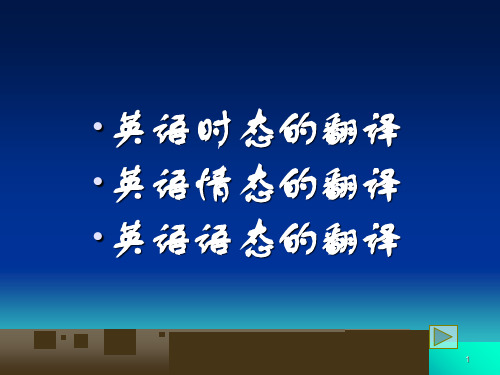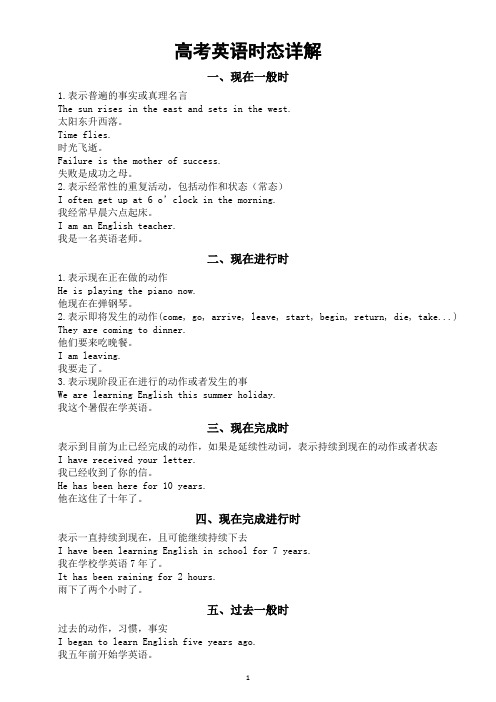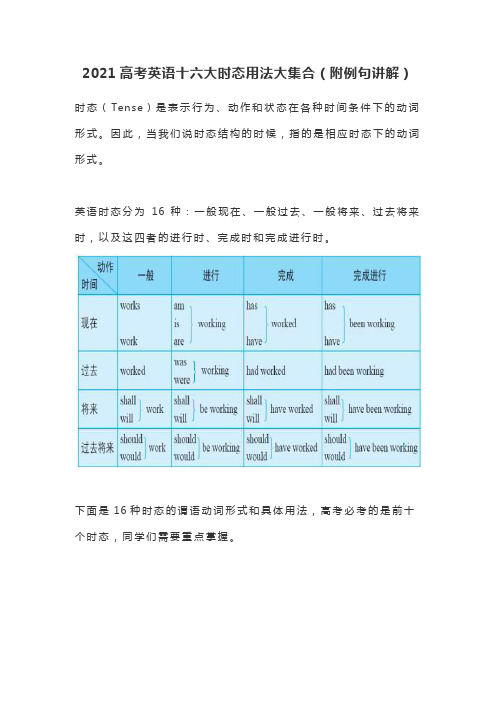新课标高三英语语法时态语态复习汉译英翻译
英语时态的翻译

“ could + 完成时 〞 用于肯定句中
• 可以表示“ 本来可以完成而未完成的动 作〞
• We could have walked to the station;it was so near .
• 火车站很近,我们本可以走到那的。 • 也可以表示“猜测〞,但不很确定。 • I could have lost it there. • 我可能把它丢那了。
• He was set upon by 2 masked men. • 他遭到两个蒙面男子的袭击。
• They were given hearty welcome. • 他们受到了热烈欢迎。 • Natural light or “white〞 light is in
fact made up of many colors. • 自然光或者“白光〞 由许多种颜色组成27。
• 允许美国俘虏领取红十字会的食品包裹。
29
• Many strange new means of transport have been developed in our century, th e strangest of them being perhaps the hovercraft.
• 本世纪研制了许多新奇的交通工具, 其 中最奇特的或许就数气垫船了。
11
情态动词
情态动词+动词原形 情态动词+动词现在进行时 情态动词+动词完成时
含义不同
12
情态动词+动词原形 表示对现在或将来的情况的推测
此时动词通常为系动词
• I don‘t know where she is, she may be in Wuhan.
• 我不知道她现在在哪儿,可 能在武汉吧。
高中英语高考复习时态详细讲解(共16类)

高考英语时态详解一、现在一般时1.表示普遍的事实或真理名言The sun rises in the east and sets in the west.太阳东升西落。
Time flies.时光飞逝。
Failure is the mother of success.失败是成功之母。
2.表示经常性的重复活动,包括动作和状态(常态)I often get up at 6 o’clock in the morning.我经常早晨六点起床。
I am an English teacher.我是一名英语老师。
二、现在进行时1.表示现在正在做的动作He is playing the piano now.他现在在弹钢琴。
2.表示即将发生的动作(come, go, arrive, leave, start, begin, return, die, take...) They are coming to dinner.他们要来吃晚餐。
I am leaving.我要走了。
3.表示现阶段正在进行的动作或者发生的事We are learning English this summer holiday.我这个暑假在学英语。
三、现在完成时表示到目前为止已经完成的动作,如果是延续性动词,表示持续到现在的动作或者状态I have received your letter.我已经收到了你的信。
He has been here for 10 years.他在这住了十年了。
四、现在完成进行时表示一直持续到现在,且可能继续持续下去I have been learning English in school for 7 years.我在学校学英语7年了。
It has been raining for 2 hours.雨下了两个小时了。
五、过去一般时过去的动作,习惯,事实I began to learn English five years ago.我五年前开始学英语。
高三英语高考语法知识点归纳总结动词的时态和语态

说明: 正确选项为 B. 从 I don ’t know if he has finish
直在写。
动词的被动语态 常用被 动语态
一般过去时与过去进行时的比较
一般过去时只表达过去 的动作或状态
Tom________ into the house when no one __________ A. slipped; was noticing B. had slipped; noticed C. slipped; had noticed D. was slipping; noticed 说明: slip 和 notice 为同时发生的动作, 因此 B、C 为 指过去有结果的动作(他溜进去了) ,when no one w 进去的一刹那发生的情况(没有人注意) 。
by 短 语, when,before 引起的时间状语连用。 We will have finished senior Book 2 by the end of this term. 用来表示从过去某一时刻开始一直持续到现在(还要
继续下 去)的动作。He has been doing the maths problems since 8:00. 表示动作或状态从过去某个时刻开始一直延续到另一 个过去时刻才完成,还将继续下去。 一般将来时表示将来要发生的动作和存在的状况 (详见下面 2.一般将来时的特殊表达方式的比较)
3.容易混淆的时态比较 项目
区别
例句
现在完成时强调过去动 作对现在产生的影响或 造成的结果
We haven ’ t heard from Jane for a long time. What do y
to her?
A. was happening B. happens
2021高考英语十六大时态用法大集合(附例句讲解)(12页)

2021高考英语十六大时态用法大集合(附例句讲解)时态(Tense)是表示行为、动作和状态在各种时间条件下的动词形式。
因此,当我们说时态结构的时候,指的是相应时态下的动词形式。
英语时态分为16种:一般现在、一般过去、一般将来、过去将来时,以及这四者的进行时、完成时和完成进行时。
下面是16种时态的谓语动词形式和具体用法,高考必考的是前十个时态,同学们需要重点掌握。
1.一般现在时(do/does; is/am/are)①表示现在的情况、状态或特征。
例:He is a student.他是一个学生。
②表示经常性、习惯性动作。
例:He always helps others.他总是帮助别人。
③客观事实和普遍真理。
例:The earth moves around the sun.地球绕着太阳转。
④表示一个按规定、计划或安排要发生的动作。
仅限于某些表示“来、去、动、停、开始、结束、继续”等的动词,可以与表示未来时间的状语搭配使用。
常见的用法是:飞机、火车、轮船、汽车等定期定点运行的交通方式。
例:The next train leaves at 3 o'clock this afternoon.下一趟火车今天下午3点开车。
⑤在时间、条件和让步状语从句中经常用一般现在(有时也用现在完成时)表示将的来事情。
(即:主将从现原则)例:I will call you as soon as I arrive at the airport.我一到机场就会给你打电话。
When you have finished the report, I will have waited for about 3 hours.等你完成这份报告的时候,我就已经等了将近3个小时了。
2. 一般过去时(did; was/were)①表示过去某个时间发生的动作或情况。
例:I bought some fruits yesterday.我昨天买了一些水果。
(完整版)高考英语动词的时态和语态讲解

时态语态(一)一般在表示:1.在的常性、性作eg: I read English every morning.2.客真理、宽泛公立、科学事eg: The sun rises in the east.3.有的趣、好或能力eg: He likes playing football.4.存的性、特色或状eg: The situation is encouraging.5.介故事情、新eg: Workers face tough times abroad.6.按刻表或按定划、安排将要放生的作(常如:come, go, leave, arrive, begin, start, takeoff, return, stop, open, close 等) eg: The train leaves at 4:30 p.m.注意:here, there, now, then 等开的倒装句要用一般在代替在行。
如:Look! Here comes the bus.一般去表示:1.去常性、性的作或状eg: He often cried when he was a boy.2.去某的状或作eg: I went to the bank just now.3.用于I didn ’t know ⋯或 I forgot ⋯,表示不知道或不得,但在已知道或得的事情。
eg: I didn ’tknow you were here.Sorry, I forgot to bring my book.注意:表示去常生的作,也能够用“used to do⋯”和“would do ”一般将来表示: 1.在看来今后要生的作或存在的状eg: Tom will come next week.2.事物的固有属性或必然eg: Oil will float in water.Fish will die without water.3.将来某个作的安排、划eg: He is going to speak on TV this evening.注意:将来常表达形式:will/ shall do; be going to do; be to do; be about to do(此形式不能够与状用)在行表示: 1.此此刻正在生的作eg: I ’m studying English now.2.段正在生的作eg: We are building our socialism.3.情况的性eg: I don ’treally work here. I am just helping until the secretary arrives.4.与 always, forever, constantly, continually用,表示参上或等感情色彩,但其实不是作正在行eg: He is always helping others. She is always forgetting something.5.按划、安排近期生的作(只限于come, go, leave, arrive, start, move, sail, fly, travel, stay 等) eg: A foreigner is coming to visit our school.I ’m leaving for Beijing tomorrow.注意:不宜用行的作:感: look, smell, feel, sound, taste, see, hear 感情:like, love, prefer, admire,hate, fear心:wish, hope, expect, want, need, believe, thin, understand, agree, know, remember, forget所有: have, contain, won, hold, belong to去行表示: 1.去某一刻或段生的作eg: He was watching TV this time yesterday.2.与 always, forever, constantly, continually用,表示或无等感情色彩eg: Comrade Lei Feng was always thinking of others never thinking of himself.3.去划、安排好的将来作(只限于come, go, leave, arrive, start, move, sail, fly, travel, stay 等) eg: He said he was leaving the next day.I was told the train was starting soon.注意:去行可用来描故事生的背景,如:The wind was blowing and it was raining hard.去将来表示: 1.去某一刻后将要生的去作或去的意、打算(主要用于从句中)eg: She was sure she would succeed.I thought you would come.注意:把一般将来中的助成去式,便成了去将来的表达形式在完成表示: 1.在已完成或完成且在有影响的作eg: I have finished my homew2.表示始于去持到此刻的作或状eg: He’s lived here since 2005.I ’ve 15 years.3.到目前止的一段内,多少次或第几次做某事eg: He’s been to Beijin It ’s the third time that I ’ve seen the film.4.将来某将要做完的作(限于和条件状从句)eg: Don ’tget off th stopped.5.生在去的,但已成在的或eg: We’ve all played with snow a 注意:没有包括“ 在”在内或不是截止到“ 在” 止的状不能够与在完成用。
高考英语时态语态知识点

高考英语时态语态知识点一、时态知识点1. 一般现在时一般现在时表示经常性或习惯性的动作、状态或客观真理等。
例句:Water boils at 100 degrees Celsius.2. 一般过去时一般过去时表示过去某个时间发生的动作或存在的状态。
例句:She lived in London for five years.3. 一般将来时一般将来时表示将来某个时间即将发生的动作或存在的状态。
例句:I will finish my homework tomorrow.4. 现在进行时现在进行时表示现在正在进行的动作。
例句:They are watching a movie right now.5. 过去进行时过去进行时表示过去某个时间正在进行的动作。
例句:She was studying when I called her.6. 将来进行时将来进行时表示将来某个时间正在进行的动作。
例句:This time next week, we will be traveling in Japan.7. 现在完成时现在完成时表示过去某个时间发生的动作对现在造成的影响或结果。
例句:I have finished my homework.8. 过去完成时过去完成时表示过去某个时间或动作之前已经发生的动作或存在的状态。
例句:She had already left when I arrived.9. 将来完成时将来完成时表示将来某个时间之前已经完成的动作或存在的状态。
例句:By this time tomorrow, I will have finished my report.二、语态知识点1. 主动语态主动语态表示主语是动作的执行者。
例句:She wrote a letter.2. 被动语态被动语态表示主语是动作的承受者,强调动作对主语的影响。
例句:The letter was written by her.3. 进行时的被动语态进行时的被动语态表示主语正在被动地进行某个动作。
高三英语时态知识点
高三英语时态知识点一、一般现在时态 (Simple Present Tense)一般现在时用于表达经常性或习惯性的动作、普遍真理、科学事实、常规行为或现状等。
1. 结构:主语 + 动词原形 / 第三人称单数动词 + -s / -es2. 示例:- I go to school every day. (我每天去学校。
)- He likes to play football. (他喜欢踢足球。
)- Water boils at 100 degrees Celsius. (水在100摄氏度时沸腾。
) - The sun rises in the east. (太阳从东方升起。
)- The train arrives at 8 o'clock. (火车在8点到达。
)二、一般过去时态 (Simple Past Tense)一般过去时用于对过去发生的动作、事实或状态的陈述。
1. 结构:主语 + 动词过去式 / 动词的第二形式2. 示例:- She traveled to Paris last year. (她去年去了巴黎。
)- They played basketball yesterday. (他们昨天打篮球。
)- I visited my grandparents on the weekend. (我在周末拜访了我的祖父母。
)三、一般将来时态 (Simple Future Tense)一般将来时用于表示将要发生的动作或情况。
1. 结构:主语 + will / shall + 动词原形2. 示例:- I will study abroad next year. (我明年将出国留学。
)- We shall visit our friends on Saturday. (我们将在周六拜访我们的朋友。
)- He will help you with the project. (他将帮助你完成这个项目。
)四、现在进行时态 (Present Continuous Tense)现在进行时用于表示现在正在进行或发生的动作。
高中三年16种英语时态(用法+例句)一篇文章全概括
高中三年16种英语时态(用法+例句)一篇文章全概括1一般现在时(do/does; is/am/are)①表示现在的情况、状态或特征。
例:He is a student.他是一个学生。
②表示经常性、习惯性动作。
例:He always helps others.他总是帮助别人。
③客观事实和普遍真理。
例:The earth moves the sun.地球绕着太阳转。
④表示一个按规定、计划或安排要发生的动作。
仅限于某些表示“来、去、动、停、开始、结束、继续”等的动词,可以与表示未来时间的状语搭配使用。
常见的用法是:飞机、火车、轮船、汽车等定期定点运行的交通方式。
例:The next train leaves at 3 o'clock this afternoon.下一趟火车今天下午3点开车。
⑤在时间、条件和让步状语从句中经常用一般现在(有时也用现在完成时)表示将的来事情。
(即:主将从现原则)例:I will call you as soon as I arrive at the airport.我一到机场就会给你打电话。
When you have finished the report, I will have waited for about 3 hours.等你完成这份报告的时候,我就已经等了将近3个小时了。
2现在进行时(am/is/are doing)①表示此时此刻正在发生的事情。
例:He is listning to the music now.他现在正在听音乐。
②表示目前一段时间内一直在做的事情,但不一定此时此刻正在做。
例:I am studying computer this term.这个学期我一直在学习计算机。
③现在进行时可以表示将来的含义。
a. 瞬时动词的进行一定表将来。
例:I am leaving.我要离开了。
b. 持续动词的进行只有有将来的时间状语或有将来语境中才表将来。
高中英语16种时态用法讲解(附例句)
高中英语16种时态用法讲解(附例句)1. 一般现在时 simple present tense用法:A) 表示现在发生的动作、情况、状态和特征【例】My father is not home yet. 我父亲还没回家.She is a student. 她是一个学生。
B) 经常性、习惯性动作,常与表示频度的副词连用,如always,often,seldom等【例】He always eats an apple in the morning. 他常常在早上吃一个苹果。
C) 表示客观事实和普遍真理The earth moves around the sun. 地球绕太阳转动。
D) 表示按计划安排好的,或将要发生的动作,可用一般现在表将来,但仅限于start, leave, go, arrive, begin等单词【例】The train leaves at 3:00 p.m.. 火车三点发车。
The show begins in half an hour. 半小时后演出开始。
E) 在时间和条件状语从句中,主句是将来时,从句通常用一般现在(有时也用现在完成时)表示将来事情【例】I will go to bed when he comes back. 等他回来了我就去睡觉。
If you don't stop the yelling, I will leave right now. 如果你还继续大吼大叫的话,我现在就走。
2. 现在进行时 present progressive tense用法:A) 表示说话时正在进行的动作【例】They are having lunch. 他们在吃饭。
B) 表示现阶段正在进行的动作【例】We are looking for a new house. 我们现在在找新房子。
3. 现在完成时 present perfect tense用法:A) 表示动作到现在为止已经完成或刚刚完成【例】I have just finished my homework. 我刚刚才写完作业。
高考英语时态知识点总结
高考英语时态知识点总结想要在高考英语中获得高分,掌握好时态是至关重要的。
时态是英语语法的重要组成部分,它能够准确表达动作发生的时间、顺序和持续性等。
在高考阅读理解、填空和写作中时态的运用尤为重要。
下面将对高考英语中常见的八种时态进行总结。
一、一般现在时(Simple Present Tense)一般现在时表示现在的状态、经常性的动作或主观真理。
常与频率副词或时间状语连用。
1. 经常性动作:I usually go swimming on weekends.我通常在周末去游泳。
2. 客观真理:The sun rises in the east.太阳从东方升起。
二、一般过去时(Simple Past Tense)一般过去时表示过去的状态、经历或已经结束的动作。
通常和表示过去的时间状语连用。
1. 过去的状态:He lived in Japan before he moved to China.他在搬到中国之前住在日本。
2. 现在已经结束的动作:I finished my homework yesterday.我昨天完成了我的作业。
三、现在进行时(Present Continuous Tense)现在进行时表示现在正在进行的动作、发生的临时动作或未来安排中的活动。
1. 正在进行的动作:She is playing basketball in the park at the moment.她此刻正在公园里打篮球。
2. 临时安排:I'm meeting my friend at five o'clock this afternoon.我今天下午五点钟要见我的朋友。
四、过去进行时(Past Continuous Tense)过去进行时表示过去某一时刻正在进行的动作。
1. 过去某一时刻正在进行的动作:They were studying English when I came.我来时他们正在学英语。
- 1、下载文档前请自行甄别文档内容的完整性,平台不提供额外的编辑、内容补充、找答案等附加服务。
- 2、"仅部分预览"的文档,不可在线预览部分如存在完整性等问题,可反馈申请退款(可完整预览的文档不适用该条件!)。
- 3、如文档侵犯您的权益,请联系客服反馈,我们会尽快为您处理(人工客服工作时间:9:00-18:30)。
新课标高三英语语法时态语态复习汉译英翻译。
新课标高三英语语法时态语态复习汉译英翻译一般现在时(经常、习惯、真理格言、时刻表、主将从现)do / does → am / is / are done常搭配的时间状语:always, often, usually, sometimes, attimes, on Saturdays, every day, once a month, frequently, every+基数词+可数名词复数(每隔…) …翻译:1.就像老话说的那样,失败是成功之母。
As the saying goes, failure is the mother of success.、2.我们每两周回家一次。
We go home every other week.3.他每天早上5:30起床,晚上10:00上床睡觉。
He get s up at 5:30 every morning and go to bed at 10:00 every night.4.作业每天都做。
(用被动语态)Homework is done everyday.5.我们家附近有一家医院,这对我们很必要。
There is a hospital nearby which is necessary for us.)6.我的航班于上午10点钟起飞。
My flight take s off at 10:00 AM.7.如果你尽力的话你会成功的。
You’ll succeed if you try your best.8.他一来我就告诉他这件事。
I’ll tell him about it as soon as he come s.补充:want, hope, plan, expect, intend,mean, suppose, think本身一般现在时后接不定式表示将来的含义9.我打算上一所重点大学。
:I expect to go to a key university.一般过去式did → was/were done常搭配的时间状语:yesterday, lastweek/month, ago, inthe past, in 1980, in the 1980s, the day before yesterday, the otherday(不久前的一天), at that time, laterthat day, once upon a time,…翻译:1.我小学上了五年。
~I stud ied at the primary school for five years.2.我半年前加入了这个俱乐部。
I join ed the club half a year ago.3.自从他加入到这个俱乐部已经半年了。
It has been half a year since I joined the club.4..他在拐角处停下把空瓶子扔进了垃圾箱。
He stopped at the corner and dropped the empty bottleinto the dustbin.5.从1952年到1959年他在部队当了7年兵。
!He serv ed in the army from 1952 to 1959 for sevenyears.6.中国不再是它过去的样子了。
China is no longer what it usedto be.7.过去,他写了五部小说。
Five novels were written by him in the past.8.是时候努力学习了。
It’s high time that you worked hard.9.如果我是你的话,我会更努力学习Englishtec。
》If I were you, I would work harder.三、现在完成时 (动作始于过去,持续到现在,并可能继续下去)has / havedone →has / have been done常搭配的时间状语:lately, recently,in/over/during thepast/last few days, these days, so far, by now, up to now, till now,…1.这是到这个学校以来,我出席的最重要的讲座。
It is the most important lecture that I have attendedsince I came to this school.<2.到目前为止,Tom已经学了2000个英语单词了。
So far, Tom has learned 2000 English words.3.她教英语有20年了。
She has taught English for 20 years.4.你去过伦敦吗Have you everbeen to London5. So far, progress _____hasbeen______ (be) very good and we are sure that thework________will be finished________ (finish) on time.…6.—I ____haven’t found________(find)the book till now.---Don’tworry. You may have left it at home. first novel_____hasreceived________(receive) good reviews since it___came out_____(出版、发行) last month.the past few years thousands of films___have been produced_________(produce) all over theworld.四、过去完成时had done → had been done,常搭配的时间状语: by then, until then,by that time,before 2000, by the end of last month, by the time he was ten,…过去完成时的用法:1.过去的过去;到过去某个时间为止的动作2.hardly/scarely(过完)… when(一般过去)no sooner(过完)… than(一般过去) 表示“刚…就…”3.It/This/That was + the 序数词 time +that (过完) “那是第几次做…”4.hope, expect, think, intend,want,suppose等用于过去完成时时表示未实现的希望、打算或意图,意为“原本…”1.他说他在国外呆了3年了。
<He said he had been abroad for 3 years.2.在我回家之前他已经离开了。
He had left before I got home.3.到上个学期末,我已经学了3000歌单词。
By the end of last term, I had learnt 3000 words.4.比赛刚刚开始就开始下雨了。
Hardly had the game began when it started to rain.5.那是他第三次犯同一个错误了。
@It was the third time that he had made the samemistake.6.我本想帮你的,但当时太忙了。
I had intended to help you, but I was too busy.五、现在进行时am/is/aredoing →am/is/are being done…现在进行时的用法:1.说话时或者现阶段正在进行的动作;2.某些短暂性动词如come/go/start/ open/close/arrive/return/begin/leave用于进行时表示按计划、安排即将发生的动作;3.与always / continually/constantly/forever/all the time 连用表示反复出现或习惯性的动作,含有厌恶、赞赏、遗憾等情绪1.我们的朋友现在正在外边等我们呢。
Our friends are waiting for us outside. 2.她现在正在大学学英语。
She is studying English in college.!3.我爸妈这周六要来看我。
My parents are coming to see my this Statuary.4.他总是先想到其他人。
He is always thinking of others first.5.教学楼正在被建。
The building is being built now.&六、过去进行时was/were doing→ was/were being done常用时间状语:at this/that time + 过去时间;at…o’clock + 过去时间;from…to…+过去时间; those days; just now;last night1.昨天晚上9点钟你在干什么呢What were you doing at nine last night2.那个男孩子正在写作业的时候突然他爸爸进来了。
The boy was doing his homework when his father came in.¥七、一般将来时will do → will be done1.老师一来,我们就开始上课。
We will begin our class as soon as the teacher comes.2.——Sorry, I forgot to buy the book you need.——It doesn’t matter. I __will____ go myself.at the clouds. It __isgoing to___________ rain.4. They are to be married inthis May. (按计划安排要发生的动作,非个人能随意改变)?5. 你妈回来之前你不要出去。
(要求或命令他人做某事)You are to stay home until your mothercomes back.6. He is to succeed. (注定)7. The Queen ____is to_______visitJapanin a week’stime.8. The train ___is about to leave_______ (leave).火车马上就要离开。
